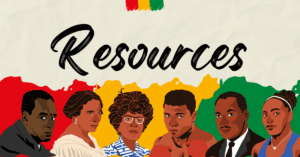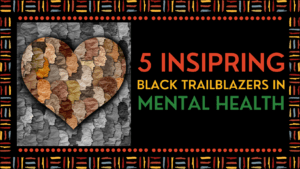5 Inspiring Black Trailblazers in Mental Health
5 Inspiring Black Trailblazers in Mental Health
Mental health in historically marginalized communities is an important conversation that should be approached with care and nuance. For many, especially in the Black community, the abuse and neglect at the hands of formal institutions has led to generational trauma and issues of mistrust. These instances are not just relegated to historical occurrences like gynecological experimentation on enslaved women or the Tuskegee Syphilis trials (that didn’t formally end until 1972.) Black utilizers of mental health services are often misdiagnosed because of bias on the part of clinicians; whether it’s misinterpretations of all emotions as “aggressive” or not believing the severity or presentation of symptoms, seeking treatment for behavioral health while Black has led to seriously adverse outcomes.
However, the resiliency within disenfranchised communities has also lead to the creation of new ways to provide care in ways that are accessible. Part of these efforts have largely involved faith-based institutions; other initiatives have led to Black-centered organizations and unique tools and approaches. Check out our list of 5 inspiring Black trailblazers in mental health and scroll to the bottom for resources on Black mental health.
-
Francis Sumner, PhD and Inez Beverly Prosser, PhD
Our first Black trailblazers in mental health were both born in 1895, Dr. Francis Sumner and Dr. Inez Beverly Prosser hold the illustrious titles of first African American man and first African American woman, respectively, to earn doctoral degrees in psychology. Dr’s. Sumner and Prosser had very different paths to their esteemed titles. Sumner did not complete high school, but was able to pass an entrance exam to Lincoln University and graduated magna cum laude with honors. Prosser, however, spent her life steeped in education having graduated from, and eventually teaching in, the segregated schools of Texas.
Both of these incredible psychologists and Black trailblazers in mental health went on to excel in their fields, teaching within universities and supporting the ongoing education of Black students. The findings within Dr. Prosser’s dissertation, “The Non-Academic Development of Negro Children in Mixed and Segregated Schools” were influential in Brown v. Board of Education. Similarly, Dr. Sumner’s legacy is reflected in his published articles, done without the support of research agencies, and is famously credited with being one of the founders of the psychology department at Howard University, one of the more than 100 Historically Black Colleges and Universities (HBCUs.)
-
Erica Woodland, LCSW
Erica Woodland is a Black, queer, transmasculine/genderqueer psychotherapist based in Baltimore, Maryland and second on our list of 5 Black trailblazers in mental health. He has worked at the intersections of “at the intersections of movements for racial, gender, economic, trans and queer justice and liberation for more than 20 years” and is the Founder and Executive Director of the National Queer and Trans Therapists of Color Network (NQTTCN.) Founded in 2016, the overall goal of NQTTCN is to increase access to healing justice resources for queer and trans people of color. Erica has been highlighted in major outlets like Time magazine, CNN, and Complex and is co-editor of Healing Justice Lineages: Dreaming at the Crossroads of Liberation, Collective Care and Safety. Learn more about NQTTCN in the resources section below.
-
Jacki McKinney, MSW
Jacki McKinney was an activist, survivor, and advocate dedicated to supporting and uplifting the experiences for the most marginalized of community members. Jacki persevered through decades of traumatic experiences, including abuse in the home, racism at the hands of institutions, and houselessness. These adversities led her to finding roles and opportunities within groups and organizations that allowed her to simultaneously process her experiences while advocating for others. She held roles in organizations like the Consumer Movement and the National Consumer Survivor Social Policy & Research Work Group and eventually co-founded the National People of Color Consumer Survivor Network. Before her passing, Jacki went on to become a recipient of Mental Health America’s highest honor, the Clifford W. Beers award, and a Lifetime Achievement Award from Substance Abuse & Mental Health Services Administration’s (SAMHSA) Voice Awards program.
-
Claud Steele, PhD
Hiram College alum and two-time alum from the Ohio State University, Dr. Claud Steele is a professor of Psychology at Stanford University and another notable individual as part our list of Black trailblazers in Mental Health. He is most well-known for his work on stereotype threat, an important framework with which we can analyze social behavior. Originally born out of examining the racial and gender gaps in academic performance, stereotype threat addresses the anxiety that arises when a person from a marginalized group is consciously, or subconsciously, aware of negative stereotypes related to their identity and anticipated performance. This anxiety can diminish confidence, create a loss of interest, and may hinder their ability to perform to their full potential. His 2010 book, Whistling Vivaldi and Other Clues to How Stereotypes Affect Us, summarizes years of research on this phenomenon and how it impacts the performance of students from marginalized communities.
-
Beverly Greene, PhD
Our final mention on our list of 5 inspiring Black Trailblazers in mental health is known as the “Pioneer of Intersectional Psychology,” Dr. Beverly Greene has specialized in the understanding of “role of institutionalized racism, sexism, heterosexism and other oppressive ideologies in the paradigms of psychology and practice of psychotherapy in organized mental health.” During her tenure as a staff psychologist at Kings County Municipal Hospital’s Inpatient Child Psychiatry Division, she was “encouraged” to teach her coworkers, who were predominantly white, about the cultural nuances they should consider when working with their predominantly Black patients. Her groundbreaking theoretical frameworks and publications have earned her numerous awards and have deepened the expectations of competencies for working with marginalized communities.
 Resources:
Resources:
National Queer & Trans Therapists of Color Network: The National Queer and Trans Therapists of Color Network (NQTTCN) is a healing justice organization committed to transforming mental health for queer and trans people of color (QTPoC).
Black Emotional and Mental Health (BEAM): BEAM is a training, movement building and grant making organization dedicated to the healing, wellness, and liberation of Black communities. BEAM envisions a world where there are no barriers to Black Healing.
The Loveland Foundation: With the barriers affecting access to treatment by members of diverse ethnic and racial groups, the Loveland Therapy Fund provides financial assistance to Black women and girls seeking therapy nationally.
Peel Dem Layers Back: Founded by Cleveland native Archie Green, the mission of Peel Dem Layers Back is to educate, empower and equip Black men and boys with essential tools necessary to live a mentally healthy life through healing hang-outs and cultural artistic expression, while representing hip-hop culture.
Safe Black Space: Safe Black Space is the umbrella under which various services are offered to address people of African ancestry’s individual and community reactions to cultural and racial trauma.
As Black History month comes to a close, we take this time to reflect on this important month and invite you to explore our additional recent blogs related to this topic: Black History Month – Joy as a Form of Resistance and Leadership & Loneliness: 3 Lessons Inspired by Reverend Dr. Martin Luther King Jr.

